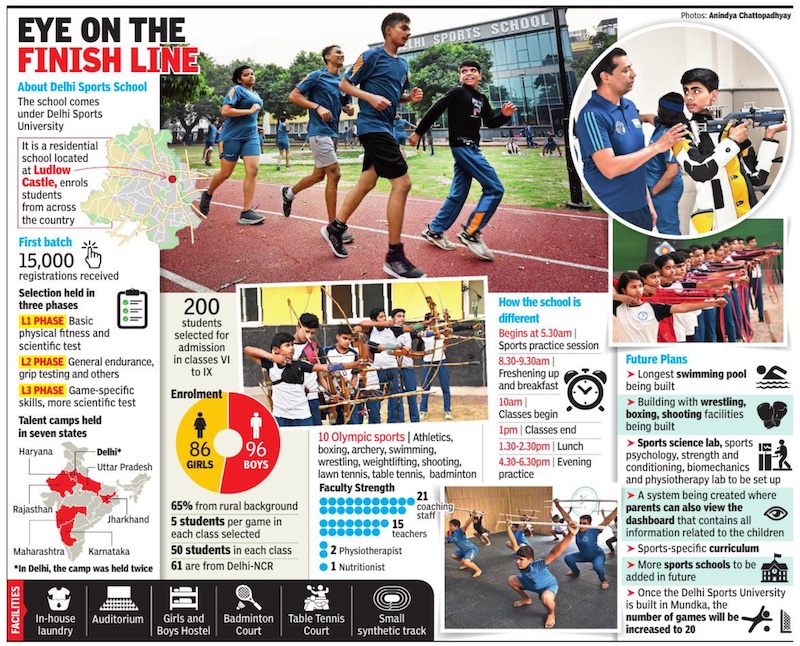Delhi Sports School, Delhi
This is a collection of articles archived for the excellence of their content. |
YEAR-WISE DEVELOPMENTS
As in 2023
Shradha Chettri, Nov 9, 2023: The Times of India

From: Shradha Chettri, Nov 9, 2023: The Times of India
New Delhi : Teenager Vargianji Ankita of Hyderabad has been craving for the special chicken biryani of her home city in the two months she has been in Delhi. The 13-year-old girl has travelled a long way from home to focus on weightlifting, a sport discipline she loves. Her supportive parents enrolled her in the first batch of the Delhi Sports School (DSS).
Like Ankita, there are 180 other students from across the country who are studying in the school. The focus here is on excelling in sports without ignoring academics. Located on a 4-acre campus at Ludlow Castle in north Delhi, DSS is a residential institution offering hostel facilities for boys and girls. Administered and managed by the Delhi Sports University (DSU), an initiative of Delhi government, it is, as DSU vice-chancellor Karnam Malleswari claimed, the first sports school under a university.
Unlike the conventional school, admissions were based on talent search camps for 10 Olympic disciplines undertaken in different parts of the country. The children went through three phases of the selection process. The eligibility norms did not require the aspirants to be Delhi domiciles.
"With our first focus on where the search camps could be held, we analysed sports data of the last five years to shortlist seven states for these camps,” Malleswari, the first Indian woman to win an Olympic medal, a weightlifting bronze at Sydney in 2000, told TOI. “The selection process enabled children from the adjoining states to join in. In the camp at Rajasthan, for instance, talented children from Madhya Pradesh and adjoining areas came. We also wanted to set up a camp in the Northeast, but we had to cancel due to the violence in Manipur.”
Of the 85 girls and 96 boys admitted to DSS, 65% come from rural backgrounds as afar as Kerala and Assam. With their diverse culture, traditions and dietary habits, the initial weeks proved trying for both the students and the administrators. "In the beginning, I was homesick and missed our regular food,” said Ankita, who is enrolled in Class VII. “But I was overjoyed to be able to practice weightlifting twice a day with a few classes in between. I also met a good friend from Chhattisgarh but she left. I am now trying to find another good friend.”
For weightlifting, badminton and table tennis, training is carried out on the school premises. For athletics, there is a small synthetic track. But for swimming, wrestling, boxing, tennis, archery and shooting, the trainees travel to other stadiums until facilities for these sports too are created on the campus.
For each sport, five students were selected for classes VI to IX, making a cumulative 50 students for each class. There are 21 coaches and around 15 teachers besides an in-house nutritionist and two physiotherapists. DSS has tied up with two hospitals for medical care and the state government has provided each student with health insurance of Rs 2 lakh.
Class VII student Jivika Singh of West Bengal, a weightlifter, is pleased to be at DSS. “I was studying in a private school, but my parents faced financial difficulties and shifted me to a gov ernment school. I didn’t like it and requested my mother to do something about it. She heard about Delhi’s sports school and now I am happy training in weightlifting.” As she spoke, the girl’s eyes welled up. Her coach interjected, “Jivika is one of our best and she has already won a bronze medal in the recently held state games.” About the challenges of hosting children from across India, DSS principal Praveen Kalra said, “We have an excellent table tennis player from Kerala. She understands nei ther English nor Hindi. Like her, some children had difficulty in adjusting to life in Delhi. But things are getting better.”
The youngsters leave for the practice at 5.30am. By 8.30, they are back to freshen up and finish breakfast. Classes start at 10am and are over by 1.30pm. Lunch is served between 1.30 and 2.30pm. There’s time for rest after that before evening practice starts at 3.30pm, with refreshments in between. Dinner is served around 7.30pm and everyone is given milk before bed.
Dressed in track pants and a T-shirt, 11-year-old Prashant Mallik from Rohtak in Haryana, said brightly, “I love the food here. And no one denies us when we ask for more food.” Mallik is a boxer.
Nutrition is important, given the background of most of the students. A teacher shared, “There is this girl from Rajasthan whose parents are daily-wage labourers. Several times, she said they went to sleep on an empty stomach. She was also used to eating a certain kind of food. We conducted workshops and helped the kids learn about calories. We asked them to design their diet. It was interesting that the wrestlers opted for beetroot juice despite saying they didn’t like it but realised it was good for health.”
Dronacharya awardee wrestler Mahavir Singh Phogat, who is one of the coaches, said, “We also want the students to later become good coaches. So, we are strengthening their basics, which we, as players, never learnt. These kids are studying things related to their sport too. I was wrestling but studying BCom (Hons).”
Apart from the five usual subjects prescribed by the Delhi Board of School Education, the curriculum also includes the theory of the various sports. More is being done. “A sports science lab and physiotherapy lab are being built,” said Malleshwari. “In two-three months, the divisions of sports psychology, strength conditioning and biomechanics, among others, will open. Once the DSU campus comes up at Mundka, there will be space for 20 sports that DSS can offer.”